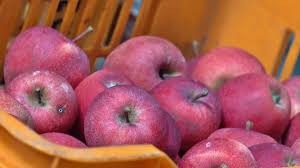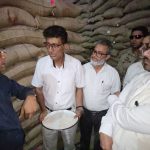Srinagar, Aug 08: Kashmir’s apple growers are breathing a sigh of relief as the Valley’s famed apple crop has survived an intense summer marked by heatwaves and prolonged dry spells. While the harvest has begun on a slow note, partly due to early market domination by apples from Himachal Pradesh, anticipation is now building around the launch of the much-awaited “apple train” later this month. “This year’s dry weather made us anxious. We feared the crop would be severely affected,” Bashir Ahmad Basheer, president of the Kashmir Valley Fruit Growers cum Dealers Union, told Rising Kashmir. “But thankfully, all varieties are intact and healthy. We expect a strong harvest in the coming weeks.”The “apple train,” a direct rail service from Kashmir to Delhi, is expected to begin operations in mid-August. Equipped with eight refrigerated bogies, the service will ensure that apples from the Valley reach national markets in fresh condition, cutting down on spoilage and significantly reducing transport costs. “Our apples will reach Delhi fresh and faster,” said Ghulam Nabi, a grower from Shopian. “Last year, we suffered due to long road delays and fruit damage. This rail link could be a game-changer.”Earlier this summer, cherries from Kashmir were successfully shipped to Middle Eastern markets and also transported by rail to Delhi, setting a positive precedent. The “apple train” is seen as an extension of this logistical momentum.This year, Himachal Pradesh witnessed an early and abundant apple harvest, which has flooded domestic markets ahead of Kashmiri produce. Experts say the early arrival of Himachali apples has affected initial pricing and demand for Kashmir’s early varieties.“Our early apples are not fetching good rates because Himachali apples have already occupied the shelves,” said Abdul Ahad, a grower from Sopore. “But the quality of our apples is unmatched, and we expect better returns during the peak harvest.”Apple cultivation remains the backbone of Kashmir’s horticulture economy, contributing nearly 75% of India’s total apple production. Districts such as Shopian, Pulwama, Baramulla, and Anantnag form the heart of this industry, which supports over 3.5 million people and generates thousands of crores in revenue annually.However, the industry has faced persistent challenges—from erratic weather patterns and poor storage infrastructure to market access issues and high transportation costs. Recent initiatives like the Horticulture Produce Marketing and Processing Corporation (HPMC) support, GI tagging and cold storage development have brought some relief. Now, the upcoming rail logistics are expected to take these efforts a step further. “As we look ahead to August and September, we are hopeful,” said Basheer. “With the right support and timely logistics, Kashmiri apples can reclaim their position in both national and global markets.”
Search
Archives
- August 2025
- July 2025
- June 2025
- May 2025
- April 2025
- March 2025
- February 2025
- January 2025
- December 2024
- November 2024
- October 2024
- September 2024
- August 2024
- July 2024
- June 2024
- May 2024
- April 2024
- March 2024
- February 2024
- January 2024
- December 2023
- November 2023
- October 2023
- September 2023
- August 2023
- July 2023
- June 2023
- May 2023
- April 2023
- March 2023
- February 2023
- January 2023
- December 2022
- November 2022
- October 2022
- September 2022
- August 2022
- July 2022
- June 2022
- May 2022
© 2022 Foxiz News Network. Ruby Design Company. All Rights Reserved.










